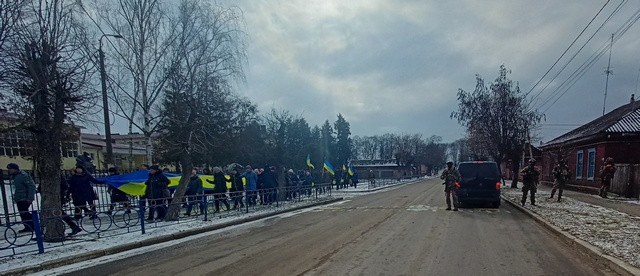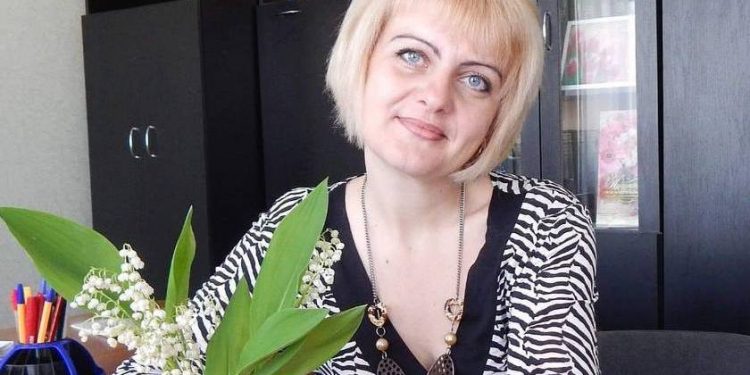The newspaper gained recognition in Ukraine through an unexpected initiative: facing the occupation of northern Chernihiv, three local newspapers started publishing as a single edition under three logos. Now, with the support of donor organizations, “Novyny Horodnyanshchyny” has been able to resume independent publication.
— Our community is located on the border with two aggressors, Russia and Belarus, — says Svitlana Tomash, the chief editor of the newspaper. — Historically, there were close family ties, and we used to visit each other across the border. Although there were rumors of possible full-scale Russian aggression, few believed it in our region, — Svitlana begins her story. — But everything changed on February 24 when we heard loud explosions at 5 in the morning… Soon the city fell under the control of the invaders.
On the second day of the occupation, Russians came to break down the doors at the premises of the regional administration, where the editorial office of ‘Novyny Horodnyanshchyny’ rented a room. At that time, the journalists evacuated all their archives, which are a historical treasure, and exist in a single copy.
— From the first month of the massive Russian invasion, we suspended our official activities because it was impossible to publish the newspaper under occupation, — says the editor. — In conditions where mail and printing services were not functioning, we could only post materials on our Facebook page, which I did.

Russians targeted and destroyed mobile communication towers, but Svitlana found spots outside the city to catch a signal. She adapted, charging her device in the morning, sharing crucial information on Facebook about the distribution of bread and medicine, and posting video messages from the mayor. This aimed to counter panic, as the occupiers tried to lure collaboration through food offers, but the Horodnya community residents consistently resisted.
After the liberation of Chernihiv, which occurred in early April 2022, ‘Novyny Horodnyanshchyny’ began to consider the possibility of resuming newspaper publication.
— Before the war, all our income came from subscriptions and advertising. Clearly, in three months of downtime, we lost all income, didn’t receive a penny, — says Svitlana Vasylivna. — When the Chernihiv printing house resumed work, the prices of paper and printing immediately skyrocketed catastrophically. It became clear that there was no financial possibility to publish a separate newspaper.
In challenging conditions, when normal life in the occupied Chernihiv region was just beginning to recover, three former district newspapers – Koryukivsky “Mayak,” Menske “Nashe Slovo,” and Horodnyansky “Novyny Horodnyanshchyny” – decided to combine their efforts to revive the printed publication.
— In this period, from May to August, we published a 12-page newspaper, starting in black and white and later switching to color — recounts Svitlana Tomash. During the team’s unpaid leave and my solo journalistic efforts, we managed to save some funds. Now, starting from September 1, 2022, we have resumed publishing as a standalone edition every Thursday.
Svitlana Vasylivna believes that ‘Novini Horodnyanshchyny’ is essential for the people. In border villages facing ongoing shelling and lacking electricity and mobile communication, newspapers serve as the sole source of information, with the local newspaper being the primary source of local news.

The editor expresses satisfaction that their 106-year-old newspaper is gaining trust, with circulation approaching pre-war levels despite people leaving. Advertising is gradually returning, providing funds for printing and paper. While salaries are sometimes insufficient, they adapt with the help of grants. The editor didn’t expect the newspaper to recover after de-occupation, but with the functioning postal service, bread deliveries, and people reluctant to leave, there’s a sense of hope in gradually standing on their feet.
According to Svitlana Vasylivna, attracting grant assistance opens up significant opportunities.
— We participate in various contests, and through this, we receive financial support, — says the editor. — However, major financial donors are not rushing to deal with us yet because, as a border territory, we are still considered a region where military actions are taking place, and there is a risk of re-invasion. Therefore, without the support of the National Union of Journalists, it would be very difficult for us. In the fall, the NUJU provided assistance for printing and salary payments. And in the spring, the Union, in partnership with the Polish ‘Gazeta Wyborcza,’ allocated funds for salary payments. The Ukrainian Press Academy provided us with a laptop, smartphone, and memory card reader. The Institute of Mass Information provided a bulletproof vest, helmet, and six power banks.
Svitlana Tomash says that during the occupation, her only journalistic tool was a smartphone… which broke shortly after the occupation. So, the new equipment came in handy.
When russians invaded Horodnia, our computers were evacuated and left in an unheated garage for a long time, causing them to almost malfunction. The laptop we received has been crucial in stabilizing editorial work. Given our tight finances, primarily covering printing and paper costs, it’s safe to say we can’t afford new equipment. Grateful for the support received, this has transformed our initial despair into hope. As we slowly recover, there’s optimism for the future.

This story about the media was created by the NUJU as part of the project ‘Enhancing the Resilience of Ukrainian Media,’ funded by Swiss Solidarity and implemented with the support of the Swiss non-profit organization Fondation Hirondelle and the Institute of Regional Press and Information (IRMI, Ukraine). Fondation Hirondelle and IRMI are implementing an institutional support project for editorial offices of Ukrainian media in the east, north, and south of our country with a focus on local press. They have also launched a 10-month program to support 18 media outlets.
This series, titled Shot Freedom of Speech, is created as part of a project Drawing Ukrainian And International Audience’s Attention To Serious Violations Of Human Rights And Crimes Against Journalists And Mass Media By The Russian Federation, which is performed by the National Union of Journalists of Ukraine, with support from the Swedish non-profit organization Civil Rights Defenders.
JOURNALISTS ARE IMPORTANT. Stories of Life and Work in Conditions of War is a cycle of materials prepared by the team of the NUJU with the support of the Swedish human rights organization Civil Rights Defenders.
#CRD

 THE NATIONAL UNION OF
JOURNALISTS OF UKRAINE
THE NATIONAL UNION OF
JOURNALISTS OF UKRAINE
















Discussion about this post